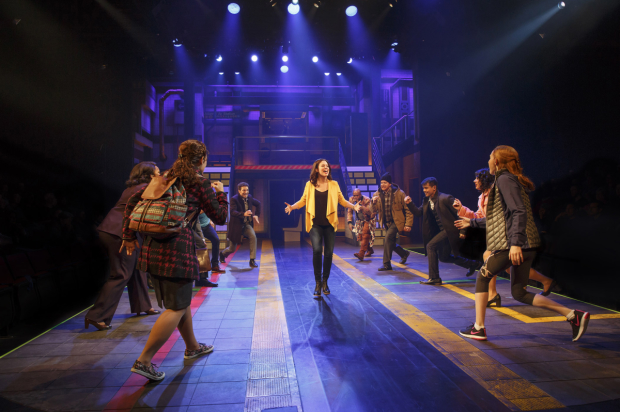In Transit

(© Joan Marcus)
The average commuter spends a total of about one whole month per year getting from place to place on the subway. For most New Yorkers, these rides are the low points of their day, packed with delays, overcrowded train cars, annoying fellow straphangers, and the overall feeling of being trapped in a weird netherworld several layers below street level.
This chilling statistic opens In Transit, a new musical with an a cappella score at Broadway's Circle in the Square Theatre. The story of 11 Manhattanites trying to break free from their stagnating lives, In Transit takes the "subway as limbo" metaphor a little too much to heart, and often feels like being stuck on a Coney Island-bound N when there are signal problems at Queensboro Plaza.
Written by Kristen Anderson-Lopez, James-Allen Ford, Russ Kaplan, and Sara Wordsworth, In Transit (which premiered off-Broadway in 2010) presents a sanitized version of the Big Apple, one that habitually betrays the general griminess of the location where it happens to be set, and relies on a host of archetypes to serve as its characters and propel the narrative. An aspiring actress in a dead-end temp job (Margo Seibert) is on the cusp of landing her big break. A lonely runner (Erin Mackey) pines for the ex-boyfriend (David Abeles) who dumped her after she uprooted her life for his. The pristine lives of a gay couple (Justin Guarini and Telly Leung) begin to falter when one of them can't come out to his conservative mother (Moya Angela). A once-wealthy financier (James Snyder) learns what it's like to be broke for the first time after getting fired.
Pretty soon, Nate (Snyder) and Jane (Seibert) meet at a bar and go on a date, while Trent (Guarini) and Steven (Leung) bump into Steven's old college pal Ali (Mackey) while they wait on the platform. These storylines intersect much like the trains at one of New York City's many station complexes (Donyale Werle's bizarrely spotless set features a long treadmill running down the middle, riffing on the Atlantic Avenue-Barclays Center hub, where nine different trains converge).
Guiding the proceedings is Boxman (Steven "Heaven" Cantor at the performance I attended), an itinerant subway beat boxer who serves as our narrator. His appearance in In Transit highlights one of the show's questionable decisions about its presentation of race. Boxman is little more than what Spike Lee once dubbed the "magical black man," whose function is solely to solve the problems of the white characters. For example, he gives Jane helpful advice about living in the moment and provides Nate with a MetroCard swipe when he needs it the most, thereby sending them on their way.
This continues throughout, with other actors of color also given largely unspecific and stereotyped characters. Angela, an African-American actress, plays a religious Texas mom who can't accept her son's homosexuality and who hangs around with (literal) gun-toting conservatives, as well as a back-talking subway attendant and a gospel-singing businesswoman. Leung and Guarini, always-reliable Broadway favorites, are unfortunately underused as a pair of bickering young gay men. Company members Mariand Torres, Gerianne Pérez, and Nicholas Ward barely even get character names let alone defining features.
This is pretty indicative of the storytelling — which manages to undermine its message of "living in the moment" on several occasions, including an eleventh-hour flash forward — as well as the music presentation. Despite wanting to explore the a cappella genre, the four writers seem to stick only in the collegiate mold of multipart harmonies, not extending themselves into the styles of barbershop, doo-wop, religious choral music, or even rock, pop, and R&B. Because the writers limit themselves to this Pitch Perfect style (down to the fact that that movie's vocal producer, Deke Sharon, provided the a cappella arrangements here), every song sounds disconcertingly similar. Sound designer Ken Travis also contributes to the problem, with his work muddling the lyrics when we need to hear them the most. Director and choreographer Kathleen Marshall adds to the college feel by lining her performers in triangular V-formations whenever there's a big group number.
Despite the less than stellar material, the actors manage to make a lot of In Transit fairly enjoyable. Seibert is effortlessly charming, Mackey and Snyder delightfully quirky, Angela offers a huge vocal presence, and Cantor makes for a welcoming narrator. If only their vehicle didn’t feel as if it was stalled between stations.











